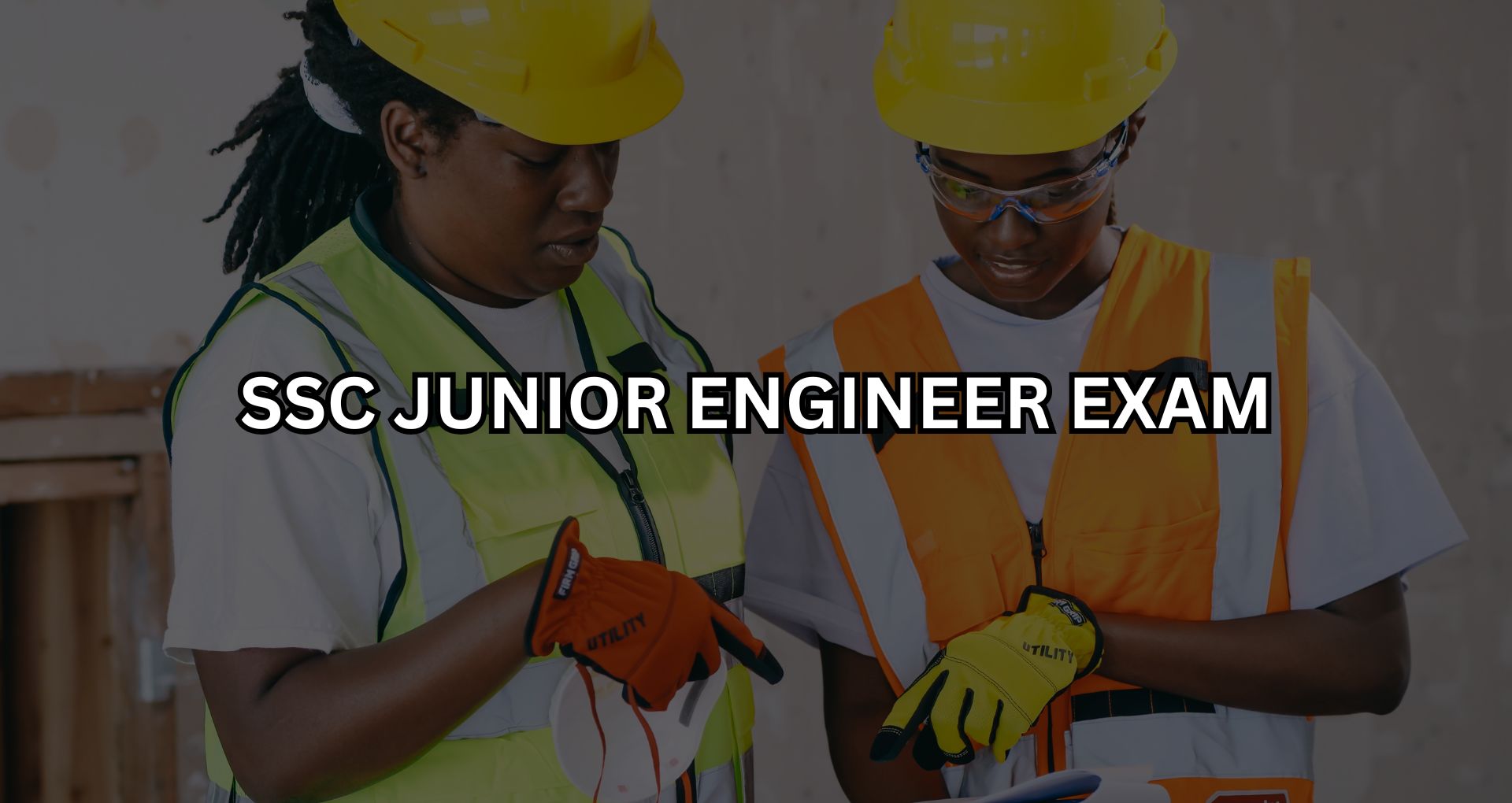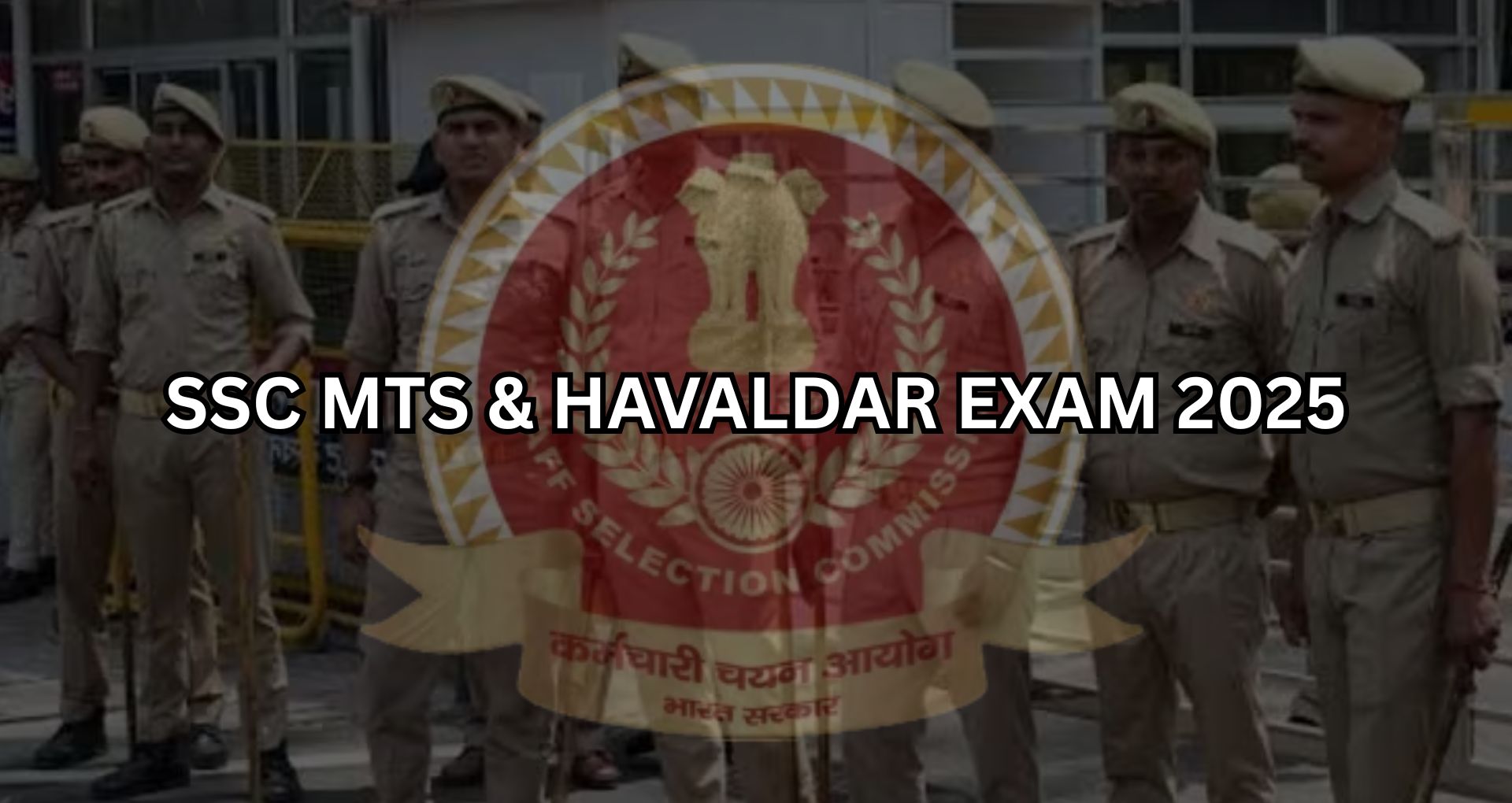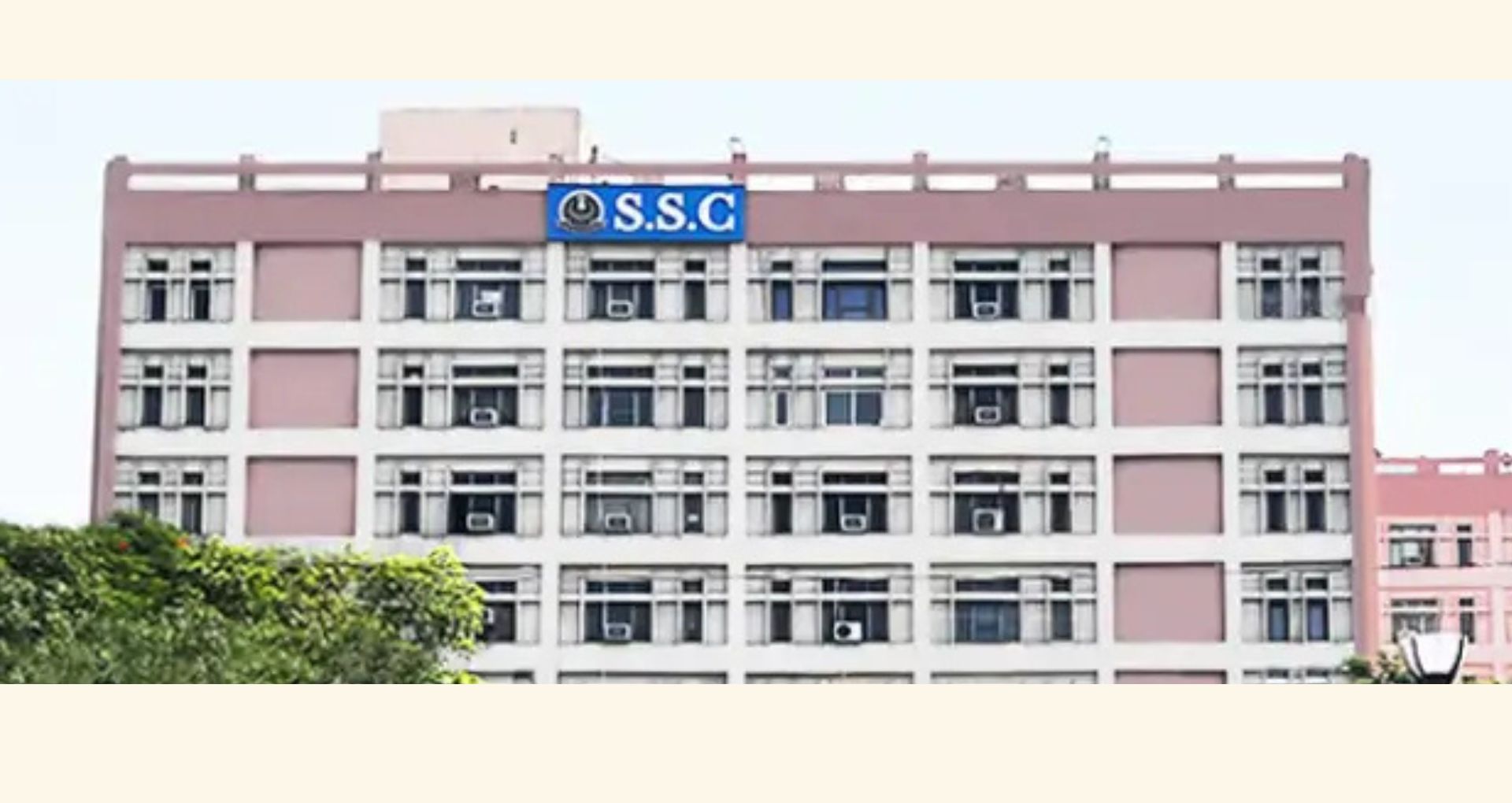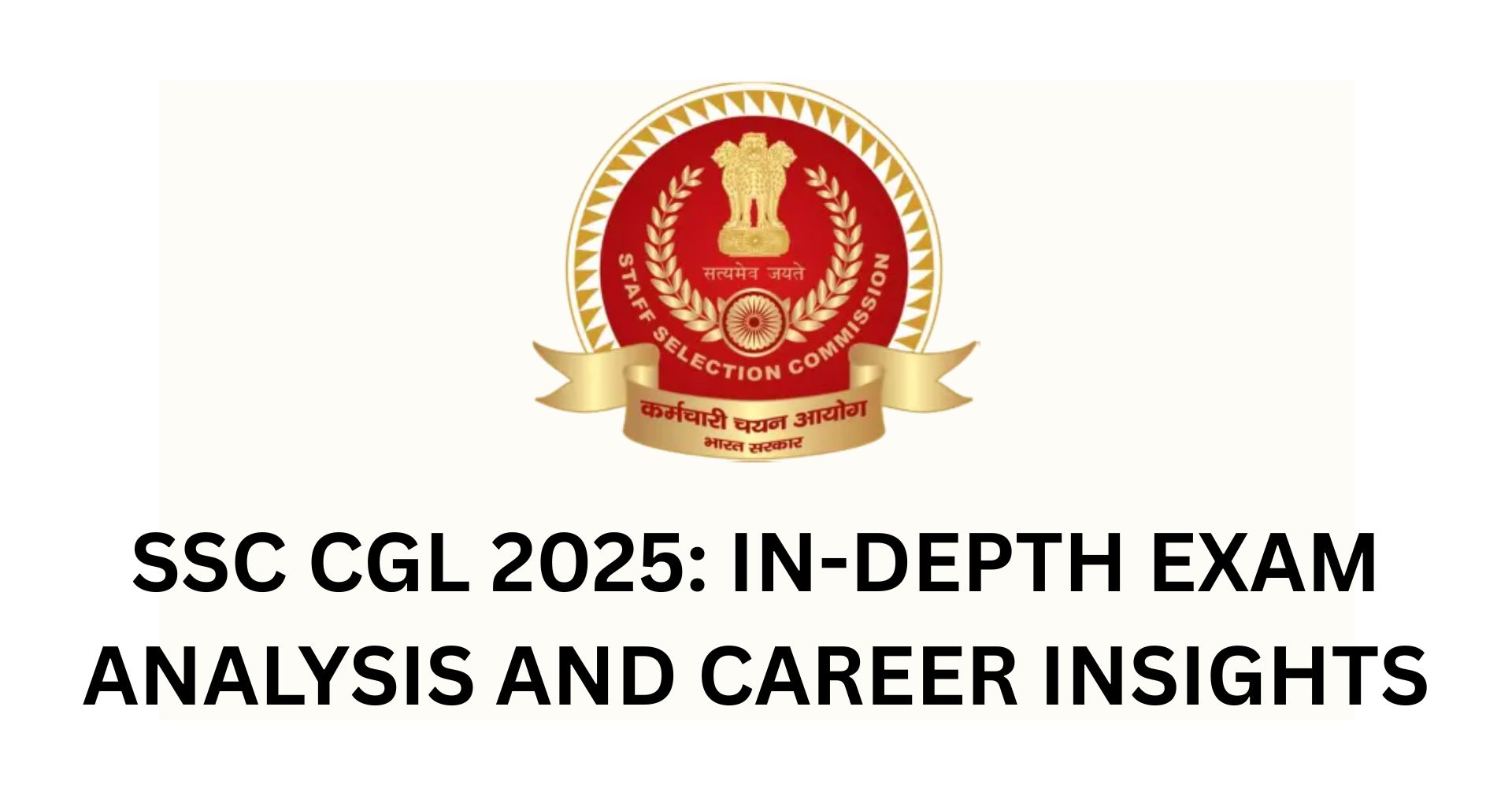Author: by Shivam Solanki
Published Date & Category - August 03, 2025 || SSC Staff Selection Commission
SSC JE 2025 Exam – Eligibility, Syllabus, Pattern & Salary
Complete Overview of SSC Junior Engineer Recruitment for Civil, Electrical & Mechanical PostsThe Staff Selection Commission has opened SSC JE 2025 recruitment for 1,340 Junior Engineer posts in Civil, Electrical and Mechanical streams across central government departments such as CPWD, MES, BRO, CWC and NTRO. Candidates must hold a diploma or degree in the relevant engineering discipline, with age limits generally between 18 and 32 years (relaxations apply for reserved categories). The selection......

Shivam Solanki
August 03, 2025
Complete Overview of SSC Junior Engineer Recruitment for Civil, Electrical & Mechanical Posts
The Staff Selection Commission has opened SSC JE 2025 recruitment for 1,340 Junior Engineer posts in Civil, Electrical and Mechanical streams across central government departments such as CPWD, MES, BRO, CWC and NTRO. Candidates must hold a diploma or degree in the relevant engineering discipline, with age limits generally between 18 and 32 years (relaxations apply for reserved categories). The selection process includes two computer-based tests—Paper-I for reasoning, general awareness and technical knowledge, and Paper-II for discipline-specific descriptive questions—followed by document verification.
What’s SSC JE?
The SSC Junior Engineer exam is conducted by the Staff Selection Commission. It recruits diploma or degree holders in engineering for Junior Engineer posts in government departments. Common branches are Civil, Electrical, and Mechanical.
These are official postings under ministries like Border Roads Organization (BRO), Central Public Works Department (CPWD), Central Water Commission, MES, Brahmaputra Board, NTRO, and more
Who can apply: Qualification
- A Bachelor’s degree (BE/BTech) or a three-year diploma in Civil, Electrical, Mechanical, or Automobile engineering from a recognised institute.
- In some departments like BRO, applicants with a diploma also need two years of relevant work experience (planning, execution, maintenance).
- If you have degree, work experience isn’t required. If you have only diploma, check specific department rules.
Who can apply: Age and nationality
- Most posts require candidates to be between 18 and 32 years old as of a fixed cut-off date (usually 01 January of next year). Some positions require upper age limit of 30 years
- Reserved categories get relaxation: SC/ST: +5 years, OBC: +3 years, with additional relaxations for ex-servicemen and riot victims smaller groups
- Nationality rules apply: Indian citizens, subjects of Nepal or Bhutan, Tibetan refugees (before 1 Jan 1962), or persons of Indian origin from specified countries with eligibility certificate
Key dates and vacancies (2025 cycle)
- Notification was released on 30‑06‑2025. Applications opened the same day on the SSC official site
- Application window closed on 21‑07‑2025. Fee payment up to 22‑07‑2025. Correction window ran 01‑08‑2025 to 02‑08‑2025
- Paper‑I (CBT) scheduled: 27‑31 October 2025. Paper‑II (CBT) planned for Jan–Feb 2026
- About 1,340 vacancies across Civil, Mechanical, and Electrical posts in various departments
Salary and job
- Posts fall under Level 6 in Pay Matrix, pay range ₹35,400–1,12,400 under the 7th Central Pay Commission
- After your selection in Paper‑I, Paper‑II, document verification, and medical clearance, you'll join a central government engineering post as Junior Engineer.
Exam structure
The SSC JE selection has two papers:
Paper-I (Objective, CBT):
- Total marks: 200. Duration: 2 hours.
- Sections:
- 1. General Intelligence & Reasoning – 50 marks (50 MCQs)
- 2. General Awareness – 50 marks
- 3. Technical Engineering (Civil or Electrical or Mechanical) – 100 marks
- Negative marking: 0.25 marks for each wrong answer in Paper‑I
- Questions in English and Hindi.
Paper-II (Objective, CBT):
- Marks: 300, Duration: 2 hours.
- Only technical branch questions—Civil, Electrical, or Mechanical depending on your choice.
- Negative marking: 1 mark per wrong answer
What’s in the syllabus?
General part in Paper-I
- General Intelligence & Reasoning: analogies, spatial orientation, series, problem-solving, classification, visual memory, decision making, judgment
- General Awareness: India history, geography, polity, economic scene, science & current events
Technical part in both papers:
Syllabus aligns roughly with diploma or undergraduate engineering level.
Civil Engineering topics:
Building materials, estimating and costing, surveying, soil mechanics, hydraulics, environmental engineering, transportation, irrigation, structural engineering
Electrical Engineering topics:
Basic electrical concepts, circuit laws, AC/DC fundamentals, magnetic circuits, electrical machines, measurement and instruments; distribution systems, switchgear, power systems.
Mechanical Engineering topics:
Theory of machines, strength of materials, thermodynamics, fluid mechanics, machine design, production/industrial engineering
Experience and trust
- Diploma holders often work as junior engineers in infrastructure and public works projects.
- Required departments clearly list if experience is needed (mostly for diploma candidates in BRO or MES).
- Capable authorities like SSC issue seat allotments and document verification to ensure standards are upheld.
Application steps (based on 2025 process)
- Register on ssc.gov.in after notification release.
- Fill registration with personal details.
- Upload scanned photo, signature, and educational certificates.
- Choose your engineering discipline and department.
- Pay application fee online (refundable/not waived depending on category).
- Complete correction window if needed.
- Download admit card before exam.
- Appear for Paper-I and Paper-II.
- Shortlisted candidates go for document verification and medical exam.
Preparation pointers
- Target high-weight sections in general awareness and reasoning.
- For civil, brush up structural formulas, surveying methods, soil and hydraulics.
- Electrical: go over machines, circuits, AC theory, measuring instruments.
- Mechanical: focus on fluid mechanics, thermodynamics, machine design.
- Use past SSC JE papers to understand question patterns.
- Regular revision and mock tests help with pacing and negative marking.
| Item | Details |
|---|---|
| Level of posts | Junior Engineer – Group B, Non-Gazetted (Pay Level 6) |
| Educational requirements | BE/BTech or 3-yr Diploma in Civil/Electrical/Mechanical (Diploma + 2 years work for some posts) |
| Age limit | 18–30/32 years (depending on department; relaxations for reserved categories) |
| Notification date | 30-06-2025 |
| Application window | 30-06 to 21-07-2025 |
| Paper I dates | 27-31 October 2025 |
| Paper II dates | Jan–Feb 2026 |
| Vacancies | ~1,340 |
| Pay scale | ₹35,400–1,12,400 (Level 6) |
Why this matters
If you hold either a diploma or degree in engineering, SSC JE offers central government job opportunities across key departments. It’s open to both fresh graduates and experienced diploma holders. The pay and post are stable and respected. Government regulation makes the steps fair but specific—read carefully before you apply.
If you have questions about syllabus details in your branch, age relaxation, document proof, or coaching strategy, feel free to ask. Contact us @ connect@sarjobs.in
SSC JE 2025 – Frequently Asked Questions
What is SSC JE 2025?
The SSC Junior Engineer (JE) exam is conducted by the Staff Selection Commission to recruit engineers for central government departments. It offers posts in Civil, Electrical, and Mechanical branches under organisations like CPWD, BRO, CWC, MES, and others. The 2025 cycle has about 1,340 vacancies.
Who can apply for SSC JE 2025?
Candidates must have either:
- BE/BTech degree in Civil, Electrical, or Mechanical Engineering, OR
- 3-year diploma in Civil, Electrical, Mechanical, or Automobile Engineering (some posts also need 2 years’ work experience)
Eligibility varies slightly by department, especially in BRO and MES.
What is the age limit for SSC JE 2025?
- Generally between 18 and 32 years depending on department
- Some posts have a limit of 18–30 years
- Age relaxations: SC/ST +5 years, OBC +3 years, others as per rules
What is the selection process?
The selection process has two computer-based stages:
- Paper I: General Intelligence & Reasoning (50 marks), General Awareness (50 marks), Technical subject (100 marks)
- Paper II: Only technical questions (300 marks)
After the exams, document verification and a medical examination are conducted.
What is the exam pattern?
Paper I:
- 200 marks, 2 hours duration
- Negative marking: 0.25 marks per wrong answer
Paper II:
- 300 marks, 2 hours
- Negative marking: 1 mark per wrong answer
What is the syllabus for SSC JE 2025?
General Intelligence & Reasoning: Analogies, classification, problem solving, visual memory
General Awareness: History, geography, polity, economy, science, current affairs
Technical Subjects:
- Civil: Building materials, surveying, soil mechanics, hydraulics, structural engineering
- Electrical: Circuits, electrical machines, power systems, switchgear, measurement
- Mechanical: Theory of machines, thermodynamics, fluid mechanics, machine design
What are the important dates for SSC JE 2025?
- Notification Release: 30-06-2025
- Applications: 30-06-2025 to 21-07-2025
- Paper I: 27-31 October 2025
- Paper II: Jan–Feb 2026
What is the salary for SSC JE posts?
All posts are in Pay Level-6 under the 7th CPC, with a salary range of ₹35,400–₹1,12,400 plus allowances such as DA, HRA, and TA.
What is the career scope for SSC JE?
Junior Engineers can be promoted to Assistant Engineer, Executive Engineer, and higher levels based on departmental exams and experience.
How should I prepare for SSC JE 2025?
Cover the entire syllabus, focus on your engineering discipline, practice mock tests, revise previous years’ papers, and maintain accuracy to avoid negative marking.

Shivam Solanki is a job analyst and staff writer at Sarjobs.in, with a focus on defence, railway, SSC, and state-level recruitment updates. With years of experience tracking government job trends, he brings clear and timely information to readers preparing for competitive exams. Shivam covers application notices, result updates, syllabus details, and important changes from official sources. His practical writing style helps aspirants quickly understand what’s relevant and how to act on it. Through consistent efforts, Shivam aims to support candidates across India in finding accurate job information without confusion or delay. View more...




